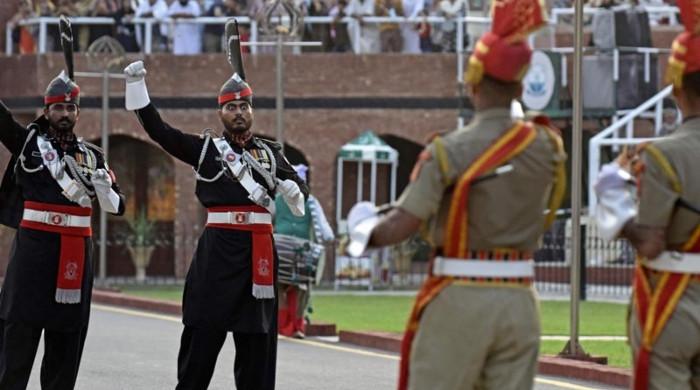Attari Border Ceremony Marked by Heightened Tensions
Amidst the usual display of energetic soldiers performing high kicks to rousing patriotic tunes, the daily border ceremony between India and Pakistan took place. Spectators gathered to watch the display, but a key element was absent this time: the customary handshake between soldiers from both sides did not occur.
This omission highlights the deteriorated relations after New Delhi accused Islamabad of supporting an attack on tourists in Pahalgam on April 22, resulting in the highest number of civilian fatalities in years in Illegally Indian Occupied Jammu and Kashmir (IIOJK). Pakistan has refuted these accusations, leading to diplomatic tensions, the expulsion of citizens, and the closure of the border.
The gates separating the two nations remain firmly shut.
Patriotic Sentiments Amidst Concerns
Simarjeet Singh, a 17-year-old from Amritsar, with his face painted in the colors of the Indian flag, expressed, “It just fills you with passion and patriotic pride.”
Many are worried about potential military escalation in the near future.
A Popular Spectacle
The Attari-Wagah border in Punjab has long been a popular tourist destination. Visitors from both countries traditionally gather to support the soldiers’ theatrical display.
While the crowd was smaller than usual on Saturday, thousands of Indians still attended to demonstrate their allegiance. Singh, who attended with college friends, noted, “There were people from all over who looked and dressed differently but were cheering and screaming at the same time — for our country and the soldiers.”
The stadium-like area near the gates was filled with cheering, primarily on the Indian side, where approximately 5,000 people were present. The Pakistani side saw significantly less support.
Historical Context and Current Anxieties
The border, a result of the partition in 1947, divided the subcontinent into India and Pakistan. Despite numerous diplomatic and military conflicts over the years, the daily border ritual has largely continued.
Reena Devi, 54, and PK Nath, 70, tourists from Tezpur, Assam, who are touring India, shared their excitement about witnessing the ceremony and being at the border. Nath mentioned their plan to visit a Hindu site in IIOJK, adding that some members of the group now have concerns about security there.
As the ceremony leaders spurred on the crowd, Indian soldiers in elaborate hats marched towards the closed gate, mirroring the actions of Pakistani soldiers on the other side.
In addition to the ceremony, the cancellation of visas has separated families, as citizens were required to leave before India’s April 29 deadline.
Harpal Singh, a taxi driver from Amritsar who frequently transports visitors to the ceremony, acknowledged the current anxiety but maintained that the spectacle is still worthwhile. He stated, “There was no one who didn’t come back impressed and excited”.
KT Ramesh, 57, from Kerala, felt that even the reduced ceremony was “worth it”, adding, “Everyone was talking about it. We don’t like a war but this time we must teach them a lesson.”



Comments (0)
No comments yet. Be the first to comment!
Leave a Comment